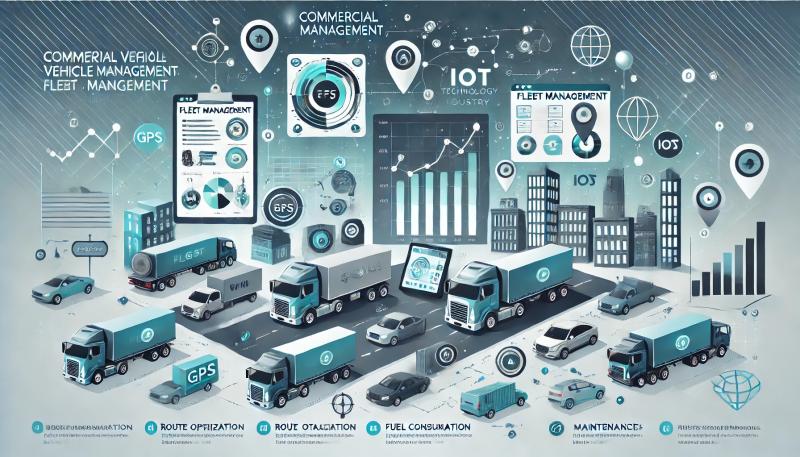Key Market Trends Shaping the Commercial Vehicle Fleet Management Market in the Transportation

The global commercial vehicle fleet management market is experiencing significant transformation, driven by advancements in technology, evolving regulations, and increasing demand for operational efficiency. Fleet management is a critical component in optimizing logistics, reducing costs, and enhancing the safety and performance of commercial vehicles.
According to BIS Research, the global commercial vehicle fleet management market for transportation industry is projected to reach $13.47 billion by 2032 from $6.37 billion in 2023, growing at a CAGR of 8.35% during the forecast period of 2024-2032.
As the transportation industry continues to evolve, several key trends are shaping the future of the commercial vehicle fleet management market.
Adoption of Telematics and IoT Integration
Telematics, combined with the Internet of Things (IoT), is one of the most impactful trends in the fleet management market. These technologies enable real-time monitoring and management of fleet vehicles, offering critical insights into vehicle location, fuel usage, driver behavior, and overall performance. By integrating telematics systems, fleet managers can make data-driven decisions, optimize routes, and reduce operating costs.
Market Impact:
Increased adoption of telematics and IoT solutions is fueling growth in the global fleet management market.
Leading telematics providers, such as Samsara, Geotab, and Verizon Connect, are expanding their services to meet the growing demand for real-time tracking and fleet data analytics.
With increasing regulatory pressure for fleet transparency and safety, telematics will become a standard across commercial fleets worldwide.
Rising Demand for Predictive Maintenance Solutions
Predictive Maintenance is a game-changer for fleet management, allowing companies to minimize vehicle downtime and reduce unexpected repair costs. By using AI and data analytics, fleet operators can predict when a vehicle is likely to experience a mechanical issue based on performance data, vehicle age, and historical maintenance records.
These systems provide real-time alerts for potential issues, enabling proactive repairs before a breakdown occurs. Predictive maintenance improves fleet uptime, reduces operational disruptions, and extends the lifespan of vehicles.
Market Impact:
Predictive maintenance is becoming a critical service for fleet managers, leading to a surge in demand for AI-powered fleet management platforms.
This trend will result in lower maintenance costs and improved vehicle reliability, making it a key growth driver in the global commercial vehicle fleet management market.
Companies like Trimble and Fleet Complete are leading the charge in offering advanced predictive maintenance features for fleet operators.
Growth of Electric and Hybrid Commercial Fleets
The push toward sustainable transportation is accelerating the adoption of electric and hybrid vehicles (EVs) in commercial fleets. Governments worldwide are implementing stricter emissions regulations and offering incentives for fleets to adopt cleaner technologies. As a result, fleet managers are increasingly incorporating EVs and hybrids into their operations to reduce carbon emissions, comply with environmental regulations, and lower fuel costs.
Market Impact:
The shift towards electric and hybrid commercial fleets will boost demand for specialized fleet management systems that can monitor battery health, charging patterns, and energy consumption.
Companies like ChargePoint and Electriphi are offering solutions tailored to managing electric fleets, contributing to the growth of the market.
The global commercial vehicle fleet management market is expected to see increased investments in EV integration, as sustainability becomes a priority for transportation companies.
Automation and Autonomous Fleet Management Solutions
The rise of autonomous vehicles and automation is another major trend shaping the future of the global fleet management market. While fully autonomous commercial fleets are still in development, the integration of semi-autonomous features—such as adaptive cruise control and lane-keeping assistance—is already making a significant impact.
Market Impact:
As automation technologies become more sophisticated, fleet management systems will increasingly offer autonomous features to enhance fleet performance and safety.
Companies developing autonomous vehicle technology, such as Waymo, are also collaborating with fleet management solution providers to create future-ready platforms for managing driverless fleets.
Automation in fleet management will pave the way for more efficient logistics and lower operational costs, making it a key growth area for the market.
Get more insights on the Automotive Market Research Reports.
Increasing Use of Cloud-Based Fleet Management Platforms
Cloud Technology is revolutionizing the fleet management industry by offering scalable, flexible solutions for fleet operators. Cloud-based fleet management platforms allow for real-time access to data from any location, enabling fleet managers to monitor and manage their vehicles remotely. These platforms provide enhanced security, data storage, and seamless updates, making them an attractive option for fleet operators looking to stay ahead of the curve.
Moreover, cloud-based systems offer integration capabilities with other software solutions, such as enterprise resource planning (ERP) systems, supply chain management tools, and customer relationship management (CRM) platforms. This connectivity enables fleet managers to have a more comprehensive view of their operations and improve overall efficiency.
Market Impact:
The shift toward cloud-based fleet management solutions is driving the global market, offering fleet operators improved scalability and flexibility.
Leading providers, including Teletrac Navman and Fleetmatics, are expanding their cloud-based offerings to meet the growing demand for real-time, data-driven fleet management tools.
The growing adoption of cloud technology is expected to drive market growth, as fleet operators seek to modernize their management processes.
Conclusion
The global commercial vehicle fleet management industry for transportation sector is being shaped by technological advancements, regulatory changes, and the increasing demand for efficient, sustainable transportation solutions. Key trends such as the adoption of telematics, predictive maintenance, the growth of electric and hybrid fleets, and the rise of cloud-based platforms are driving innovation and market growth.
As fleet operators seek to optimize their operations, reduce costs, and improve safety, the demand for advanced fleet management solutions will continue to rise. Companies that can stay ahead of these trends and offer cutting-edge solutions will be well-positioned to capitalize on the growing market and meet the evolving needs of the transportation industry.
Comments (1)
Jwala Dubey
2
SEO Expert
hi nice ...
global commercial vehicle fleet management market is experiencing significant transformation....